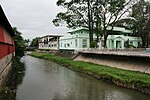Laguna (province)

Laguna ([lɐguˈna]), officially the Province of Laguna (Filipino: Lalawigan ng Laguna), is a province in the Philippines located in the Calabarzon region in Luzon. Its capital is Santa Cruz while its largest city is the City of Calamba and the province is situated southeast of Metro Manila, south of the province of Rizal, west of Quezon, north of Batangas and east of Cavite. Laguna hugs the southern shores of Laguna de Bay, the largest lake in the country. As of the 2020 census, the province's total population is 3,382,193. It is the seventh richest province in the country.Laguna is notable as the birthplace of José Rizal, the country's de facto national hero. It has numerous natural and cultural attractions such as Cavinti Falls aka Pagsanjan Falls, the University of the Philippines Los Baños and the University of the Philippines Open University in Los Baños, the hot spring resorts of Calamba on the slopes of Mount Makiling, Pila historic town plaza, Taytay Falls in Majayjay, the wood carvings and papier-mâché created by the people of Paete, the annual Sampaguita Festival in San Pedro, the turumba of Pakil, the tsinelas footwear from Liliw, the Pandan Festival of Luisiana, the Seven Lakes of San Pablo, and the Nagcarlan Underground Cemetery in Nagcarlan. Laguna is part of Greater Manila Area along with Cavite, Rizal, and Bulacan.
Excerpt from the Wikipedia article Laguna (province) (License: CC BY-SA 3.0, Authors, Images).Laguna (province)
Geographical coordinates (GPS) Address Nearby Places Show on map
Geographical coordinates (GPS)
| Latitude | Longitude |
|---|---|
| N 14.17 ° | E 121.33 ° |
Address
4012
Laguna, Philippines
Open on Google Maps






